Dmitry Shamov was born and raised in Moscow. There he graduated from the Pedagogical University. He is a teacher of mathematics and computer science. More precisely, he was.
While still a schoolboy, Dmitry took a great interest in Japan, and in his student years worked on three jobs – he saved up for studying in a Japanese language school.
Today Dmitry lives in Tokyo. He has a Japanese wife and a good job. He is a successful video blogger with over 130,000 subscribers on YouTube.
Lifkhaker interviewed Dmitry. We talked about life in Japan, about the Japanese and video blogging. It turned out that many stereotypes (Japanese – workaholics, Japanese insensitive, etc.) are far from reality.
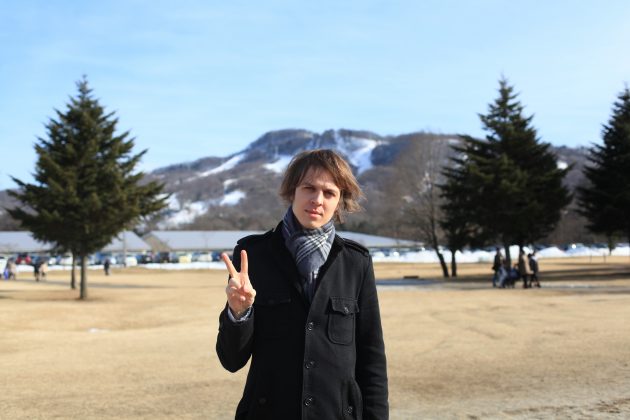
Other planet
– Dima, why Japan? How did the hobby begin?
– In my childhood, I, like many people, watched “Sailor Moon” and “Pokemon”. I just liked it. I did not even think about moving to Japan.
But at school I read the book “Pattern brocade” by Teru Miyamoto. It perfectly illustrates the Japanese spirit, the atmosphere of Japan. Then there was a timid desire to visit this country.
Then he bought books Kawabata, Abe, Yukio Mishima and other authors. I read and finally fell in love with Japan. I decided that I would definitely go there.
It seems to me that fiction allowed me to get a correct idea of Japan. After all, unlike the compilers of guidebooks, authors do not need to dissemble, exposing the country in a bright light. They just write about what Japan really is. Therefore, my idea of Japan almost completely coincided with what I saw when I arrived.
Do you remember your first day in Japan?
“Yes, as if he was on another planet.” ????
I went to study in a language school. At the same time I did not speak Japanese. AT ALL.
An hour before the landing on the plane, I was given a form that I had to fill out and present at the passport control. He was completely in Japanese. It looked like an alien tablet.
At the airport, I gave this piece of paper to some uncle, a Japanese, he put the necessary check for me. I was fingerprinted and released in peace.
Nobody met me – I decided to save on this service of the school. So I went outside and for a long time could not understand where to go, what to do, where to go. Fortunately, only two trains run from the airport: cheaper and more expensive. Not the first time, but I bought a ticket for the one that is cheaper.
He reached the station, where he had to make a transplant, and then for the first time “spoke” with the Japanese. It was necessary to understand where to go next: to the left or to the right. We tried to speak in English, but in the end he just pointed a finger, which train I sit on. In general, before school I got with difficulty: without language, with heavy bags, after a 10-hour flight. It was completely unclear where to go and what to do. Therefore, my advice to those who plan to go to a language school: pay for the transfer.
– How did you meet at the language school?
– Good. Settled in a hostel with five Chinese, showed the school. Then I went for a walk. I went out and realized: I’m in Japan!
I realized that life has changed. Nothing will be the same as before. Despite the fact that I still did not understand anything (I could not even buy food on my first walk), I took it as a step towards something bigger.
Someone will say that to go to a foreign country without the knowledge of the language, and even such a mysterious as Japan, is insanity. But for me it was a chance to completely change life.
– When did you start to enjoy life in Japan?
“Right next day.” I began to orient myself a little, and most importantly I learned the ABCs.
Hiragana and katakana
– You got the first level of Japanese language in just 1.5 years. How did you manage that?
– I came without any knowledge at all. But I will not say that the Japanese was hard for me. For example, two main syllabic alphabets – hiragana and katakana – are given a week. I learned them in three hours – whether from great motivation, or from despair. It was necessary to somehow master the “other planet”. ????
– English did not help?
– The Japanese know him poorly. They have been teaching him at school for 12 years. But they do not need it.
First, 98% of Japanese residents are Japanese. Chance to talk with an alien a little. If a Japanese to 20 years talked to a foreigner in English, it’s luck.
Secondly, the Japanese language is used everywhere. There is a game or gadget – there must be Japanese. The film comes out – it is duplicated in Japanese.
Therefore, the Japanese do not know English well and are embarrassed by this. If you turned to the Japanese in English, and he shies from you, it’s not because he is not friendly or hostile to foreigners. Most likely, he’s just afraid to show his bad English.
– What advice can you give to people studying or planning to study Japanese?
– On my channel there is a separate heading “Lessons of a living Japanese language”.
One of my main tips is that I need stability. You can not do today 10 hours, and tomorrow and the day after tomorrow do not engage. There will be no sense. You have to study every day. At least an hour, and preferably three.
When I came to the language school, there were some Chinese in my class and they had a handicap – they knew hieroglyphics. (Chinese and Japanese characters are half the same.) So the teachers said to me: “You have to practice three hours a day, and since you are a European, three times as much.”
“Nine hours ?!”
– At first I taught 14 hours a day. Then I found a part-time job, and there was less time left for the language. But I still taught: when I went to work, when I returned from it. Even between the performance of his duties in managing the restaurant: he wrote notes with words and glued them to places where no one had seen, and when he passed by, he peeped and repeated.
But, as I said, I had a huge motivation. Agree, it would be foolish to pay a huge amount of money earned by sweat and blood, to come to a language school and spend time wasted.
Therefore, the second important point in mastering the Japanese language is interest. If it is not, you will hardly learn.
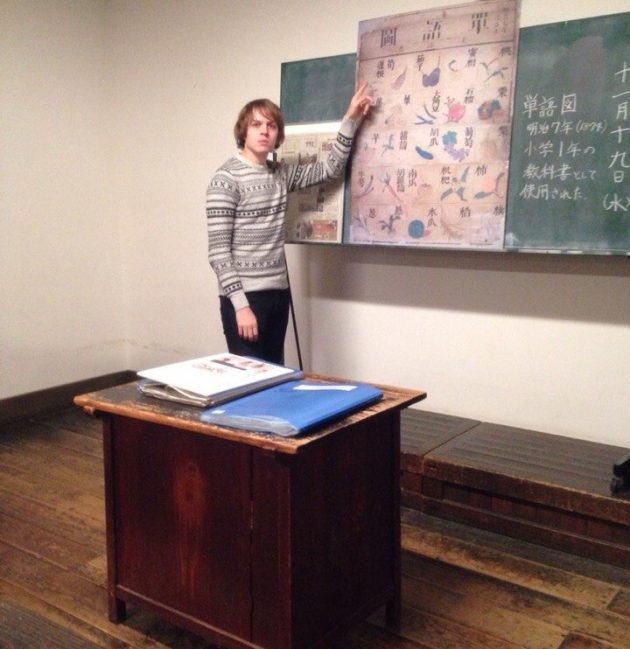
– This advice is more on psychology. But is it almost practical that helps?
– Personally, I was helped by paper cards. Do not be lazy to do them and if possible take it with you everywhere. Also, write everything by hand. Even if you can print on a computer, use mechanical memory – write.
For example, you learned five hieroglyphs. But even if it seems to you that you remember well how they are written, then write them a hundred times more. It must be eaten into the head. The next morning get up and repeat these five characters. If you make a mistake at least one, then all five again a hundred times more.
It’s difficult, but effective.
I recommend to immediately leave the training systems, where the Japanese words are written in Russian letters. This is stupid and will only confuse you. For example, how to say: SUSHI or suSi. Cyrillic can not express the pronunciation.
You can also use some programs. Of the dictionaries the best, in my opinion, is “Yarki”. There is a desktop (and on Windows, and on Mac) and mobile versions (Android and iOS). Last, however, paid, but it costs only about $ 10.
For the training of hieroglyphs, a good program “Kanji Ninja” (漢字 忍者). It is made for Japanese schoolchildren, so there are levels: for junior, middle and high school.
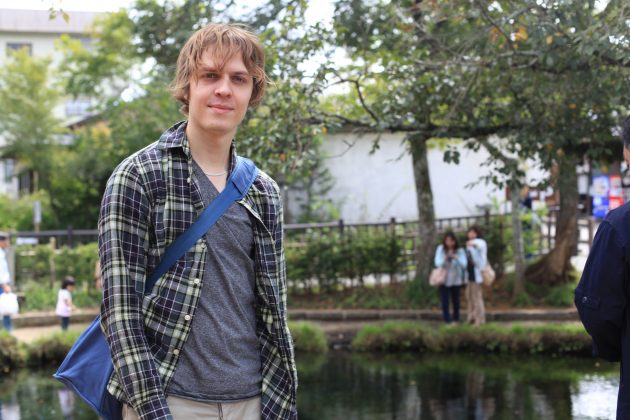
– Can you learn Japanese from films or anime?
– Can. But it must be taken into account that in anime the language is very different from the real spoken Japanese. There are used all sorts of turns, such as for steepness. In life, no one talks (if only for fun).
If you watch movies, then with Japanese subtitles.
But to really learn how to hear Japanese speech, I suggest downloading an audiobook. In Japanese there are almost no intonations and accents. Therefore, for beginners, Japanese speech merges into one – it is unclear where one thought ended and another started. But when you watch someone speak in your ear in Japanese, understanding will gradually come.
Education
– In Japan, a paid, and quite expensive, education. Does this quality guarantee?
– In Japan, it’s difficult to get into people. All this is understood, and parents initially invest in the child, that he must learn well. The majority of Japanese are quite smart and versatile.
But the education system in itself …
I saw Japanese math textbooks for high school. Students say that there are hypersyllabic tasks from which the brain melts. But many of these topics in Russia are still in high school.
– Are schoolchildren really suicidal?
– On the Japanese from the junior classes presses society: you need to study well to get into a good secondary school, and from it already into the prestigious senior. From education often depends on how the future life of the Japanese will develop.
In the understanding of Japanese society, if you do not learn to the maximum before graduation, you can not see a good life. Although now it is not entirely true, but school children still frighten.
It’s not even about the complexity of the material being studied, but in psychological pressure. All around are rivals who need to be circumvented. Pressed and parents and teachers.
In addition, in Japanese schools is not uncommon abuse of classmates. Some of this truth leads to suicide. But it is incorrect to believe that the percentage of suicides is very high. Yes, it is rather big, but still lower than in South Korea, Kazakhstan, and sometimes in Russia.
– Most Japanese have higher education. Is it so important for a career?
– Previously, a diploma of a prestigious university, such as Tokyo, guaranteed a successful career. At the same time it did not matter if it was really a good specialist or it was empty as a cork. Now there is no such thing. Now knowledge is important. A person without higher education can find a better place than a graduate of a university if he knows his job well.
But most Japanese really graduate from high school. This is considered important.
– Is it true that good attendance is half the success when studying at a Japanese university?
– Yes. There is in the Japanese language a word 出席 率, which can be translated as “percentage of visits”. It can not be lowered below 80%, and the foreigner should not cross the 90% mark at all. For a hundred percent visit there are small monetary incentives.
You just need to come to the university and take intermediate tests. This is enough to learn. In some universities (not particularly rating) in general, one visit is enough.
It is difficult to enter Japanese educational institutions, but it is easy to learn in them.
– Are there diplomas of Russian universities listed in Japan?
“Not at work.” Only if something unusual. But the diploma is quoted upon admission to graduate school.
Work up to karosi
– Is it difficult to find a job in Japan?
– Yes. And not only foreigners, but also the Japanese themselves. To pass one hundred interviews is normal.
Foreigners, of course, are more difficult because of the language. If you are a unique specialist, the only one in the world, then they will take without language, even they themselves will be invited to work. But it’s very difficult to get an ordinary position in an ordinary company. We have to fight for a place in the sun.
For example, after finishing my language school I graduated from the business school, I changed several work-outs and went through many interviews before I got a job as a sysadmin.
– And the Japanese are really so obsessed with work, that sometimes they even happen to have karosi or do they perform jaroyisatsu?
Яройисатсу – suicide because of stress at work.
– Depends on the person and on what kind of work. Labor relations in Japan vary greatly.
Previously, a person graduated from a university, arranged a company and worked there until old age. If he quit, then, as a rule, he could not find another job. Now you can at least change the company every year.
In general, the Japanese really work hard. Rather, spend a lot of time at work.
– What does it mean?
– Quantity does not mean quality.
The Japanese often do not work, but create the appearance of work. They come to the office early, go later, stretch the work, and the efficiency at the same time is small.
This, by the way, foreigners are favorably different. They simply fulfill their tasks: one has ended – we move on to the next one, all have ended – we go home.
But here it is important to understand that in Japan an employee is always part of the team. There are no independent workers – your work depends on the work of your comrades. If you have done your part of the job, and your colleague is not yet, you must sit and wait for him. Therefore, according to Parkinson’s law, the Japanese try to occupy all the time that they are assigned to work.
– A collective responsibility in Japan survived?
“The Japanese do not have the concept of” I “. There is a notion of “we”. All work for the team. If you have one, then the entire team mows. Go home, if you finished the work, and your slow colleagues are not, it’s disrespect to the team.
You have to be part of the team and not stick out. Upstarts do not like. If the boss said to do this and that, you need to sit and do it. In Russia, the initiative is welcomed: “And let’s do it wrong, but like this?”. In Japan, your opinion is of no interest to anyone. Have given the task – just do it.
Also, working in a team, people are responsible not only for themselves, but also for other members of it. Therefore, everyone tries not only to do the work themselves well, but also to look after their comrades.

“Do you think this is an effective system?”
“Partly.” In my office work, in my opinion, it gets distorted forms. If a person works in a software company and is engaged in, for example, design, it should not depend on programmers or someone else.
But if you take physical labor, it is important there that employees keep pace with each other. For example, if you look at how the Japanese build roads – it’s fantastic! We can repair a small plot for six months. In Japan, the road, destroyed by the earthquake, is restored in two or three days. There are many people involved: from asphalt pavers to the regulator, which ensures traffic safety in the emergency area. They work smoothly and with great speed.
– And do colleagues communicate outside of work?
– Rarely. It is customary to spend free time from work with my family. But there is such a thing as the Japanese corporate. It is held every week, usually on Fridays. Turnout is required. It is there that the general corporate spirit is maintained: “We are a team, we are together, and we are good fellows!”.
Sometimes such corporate parties are held in nature. And go to the barbecue is not just two or three employees who are friends with each other, namely the entire company.
– Can a foreigner count on a pension in Japan? Or do I need to obtain citizenship?
– In Japan, a quarter of the elderly and very few young. Therefore, even those who do not work pay a pension tax. This applies to foreigners between the ages of 20 and 60, regardless of whether they have citizenship. If a foreigner accurately made pension contributions, then in old age, he can expect to receive benefits from the state.
Advantages and disadvantages
– In any country there are pros and cons. What is more in Japan?
– In my opinion, pluses. Recently, I even made a video on the channel that the Russian likes in Japan.
There are a lot of advantages: from the quality of life and cleanliness to culture. Those who truly love Japan will be satisfied with life.
But there are minuses, of course. For example, very cold apartments. In the room where I am now, I am heated by the air conditioner and stove and still cold. In Japanese homes, thin walls, single-pane windows.
At the same time, housing prices vary widely between cities and districts. Also affects the type of building: apartments in high buildings and low three-story buildings stand in different ways. On average in Tokyo, renting a one-room apartment costs 70,000 yen (40,000 rubles). An apartment of a larger size, of course, is more expensive.
To buy an apartment or a house in Tokyo, you need from 23 million rubles or more. Depends, again, on the type of apartment, house, land and other things. Prices vary widely. You also need to understand that when buying land in Japan, you can not build on it what you want. Everything is strictly regulated.

In addition, the Japanese language will remain foreign to you. Until now, I’ve come across words that I have not met before. This is baffling. Consoles only that the Japanese often face such words. Also, I still can not write at the same speed as the Japanese. As a whole I keep up, but with some office clerk I can not compare.
I’m also annoyed by Japanese television.
“Oh, Japanese advertising!” Are they really … strange?
– There is some. ???? But I’m used to it, I do not notice it anymore.
By the way, the famous Japanese Internet advertisement on the Internet is rather small on TV. Advertising clips are built according to one cliche: a person (or a group of people) leaves, sings, dances, a close-up – he says the name of the company. All. It looks stupid, but the Japanese are buying. Although, perhaps, someone will like.
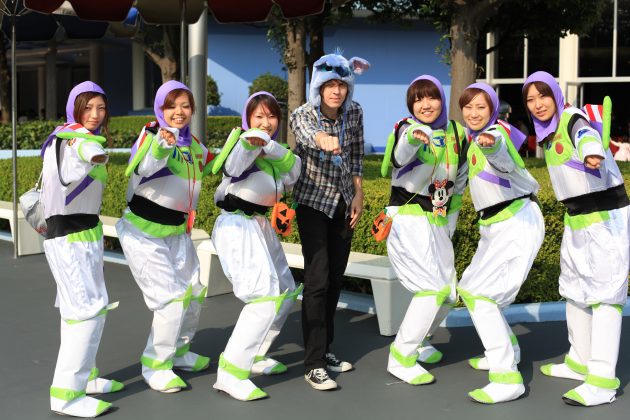
Japanese television is boring. They show food without interruption. Personally, I’m not interested in the transfer, where people half an hour looking for food, half an hour choose it and another half an hour eating, talking about nonsense. There are practically no cognitive programs or films.
But in Japan, there is no concept of a “zombie”. For them to watch TV (even this!) – this is normal.
– And Japanese prices do not strain?
– Life in Japan is not cheap. Plus, all products in Japan are subject to an additional 8% tax.
Medicine is also paid. But if there is insurance, it turns out inexpensively. But paid clinics save from queues. It is not necessary, as we do, to spend hours sitting around grannies, who come to the polyclinic as a club for interests. Therefore, to pay, for example, 1,000 yen (about 500 rubles) per reception and get quality and comfortable help for me is acceptable.
In addition, you need to correlate this with Japanese salaries.
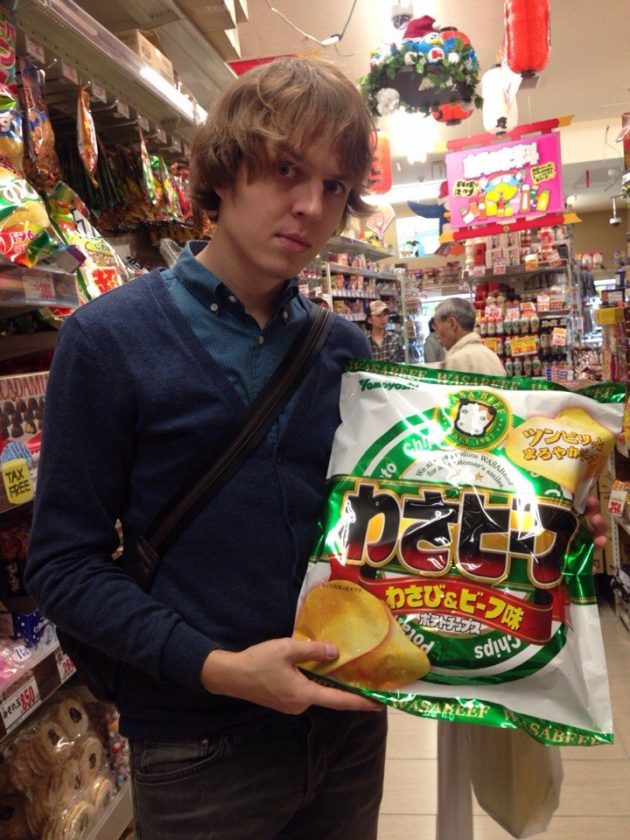
Uchi – soto – yoso
– In Japan, excellent service. And in life the Japanese are just as friendly and friendly?
– In Japan, there are echoes of class: the Japanese themselves are divided into groups depending on who they are and what they do, and others divide.
For example, there are such concepts as “teach”, “soto” and “yoso”.
Uchi is all that is inside. Family, own company, closest friends. For them, they do everything. They’ll crash into a cake, but they’ll do it.
Soto is someone else’s company, some acquaintances, neighbors, a passer-by who spoke to you on the street. With them, the Japanese are very friendly, smile, help, if necessary – take their hands, spend their time and take you where you need (for example, if you get lost).
Yoso – this is generally unfamiliar people with whom you have never spoken and are unlikely to be. For example, people surrounding in the subway – this is yoso. Absolutely outsiders. But if the yoso approached and spoke to you, then the relationship is already going to the soto stage.
To yoso, the Japanese have a strange attitude from the point of view of our mentality. A person can lie on the road, and all will go by – he yoso, whether he knows what he is lying about, maybe he likes it, why interfere in his affairs. I had a case when a man was lying on the street: he was ill. I approached and began to stop the passers-by, so that they called an ambulance (then I did not know how). Only the third stopped, the rest came quickly.
But this does not mean that people who pass by are bad. This is one of the paradoxes of the Japanese worldview.
The other is that they live in a consolidated society, but at the same time very apart.
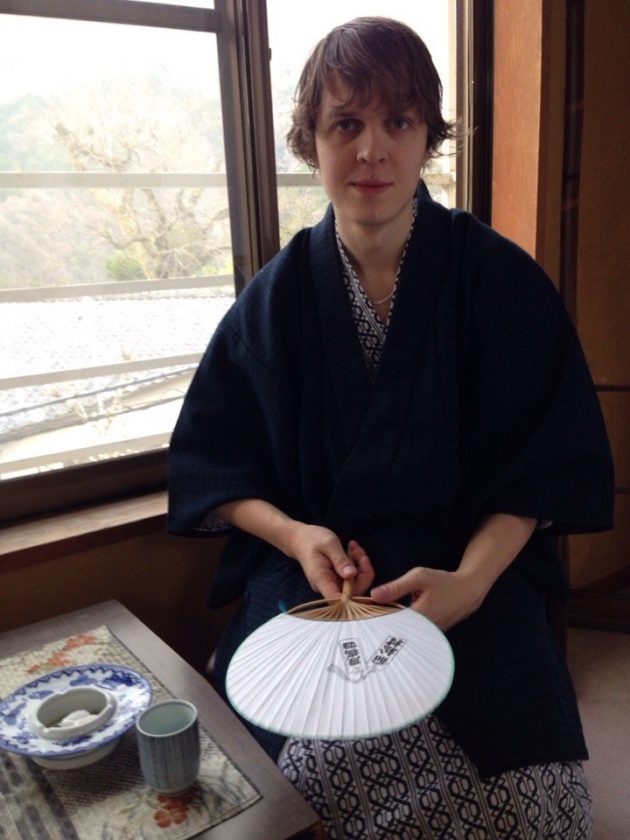
– What is it like?
– The Japanese are cold. In the sense that they do not usually show their feelings, show emotions. And this coldness happens not only in relations with soto, but also, for example, between friends. And this is perceived to be normal. Just as it is normal to meet with friends every few weeks or not to respond to several days for messages. No one takes offense at this, does not say: “Ah, here you are such-and-so, scored on our friendship!”. It is believed that a person has a personal space and he has the right to decide when and whom to admit.
Do not interfere with others – it’s very important.
I think many people know that in Japanese transport one can not talk on a mobile phone. Not only because of some kind of waves, but simply because your conversation can interfere with another person. Also in many museums in Japan they forbade taking photos. Not because of valuable exhibits that nobody can show, but because some visitors put a tripod in front of the picture and obstructed the passage or made selfies and prevented others from looking. These are important nuances for the Japanese. We must live well for ourselves and not interfere with others.
But in the moments of tragedy, the boundaries of class society are erased. You could see how the Japanese were rallied during the earthquake and tsunami four years ago. Everyone helped each other, everyone saved each other. No theft and looting. Absolutely unfamiliar people allowed themselves to spend the night for those who were left homeless. Free rations were distributed, and it never occurred to anyone to take more than one, laid to him. Suffered some cities (Tokyo, for example, almost did not touch), but this became a tragedy throughout Japan.
High tech
– It seems to us that in Japan technologies are so advanced that at every step there are solid robots. This is true?
– Japan is technically excellent, but there are no robots anywhere. In general, the city is not technically very different from any other metropolis. This is one of the many misconceptions about Japan.
– Do the Japanese have a digital addiction?
– Yes. You go in the subway, and there 90% of people are sitting, bending their heads, poking into phones. They can not talk, therefore they correspond without interruption. In Japan, the Line application is very popular.
But in transport this is understandable. Strange looks, when a guy and a girl come on a date, sit down opposite and play on their phones or correspond (sometimes even with each other). But this is also considered normal.
Also children in playgrounds do not swing on a swing, do not play mobile games. They sit on a bench, five to seven people, and play the Nintendo DS. That is, they go out into the street to play the console. Only children of three years running around, having fun, and older children have other interests.
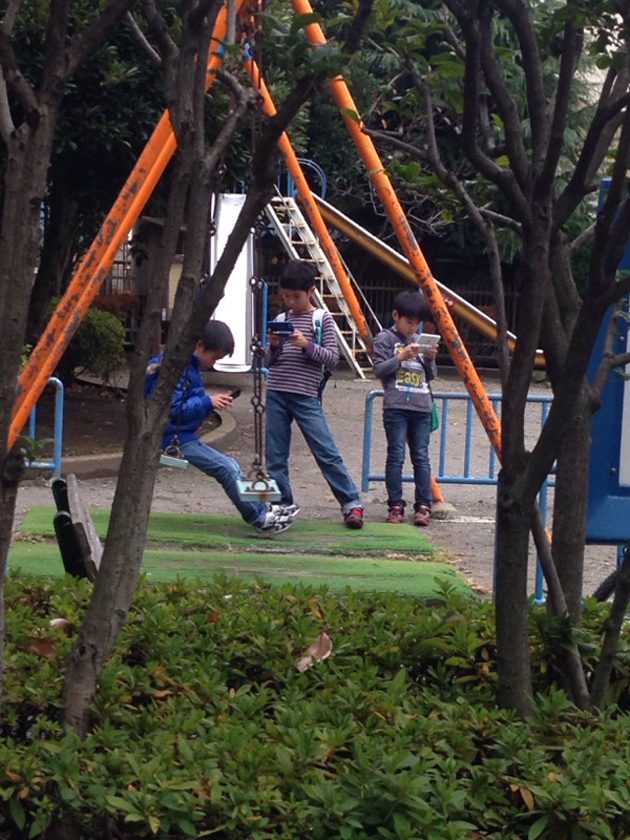
安定 – Antey
“You married in Japan.” Tell me about the peculiarities of the relationship with the Japanese.
– It all depends on the person. I was lucky. Mika and I understand each other perfectly, we have similar interests. She is even more Russian in character than a Japanese woman.
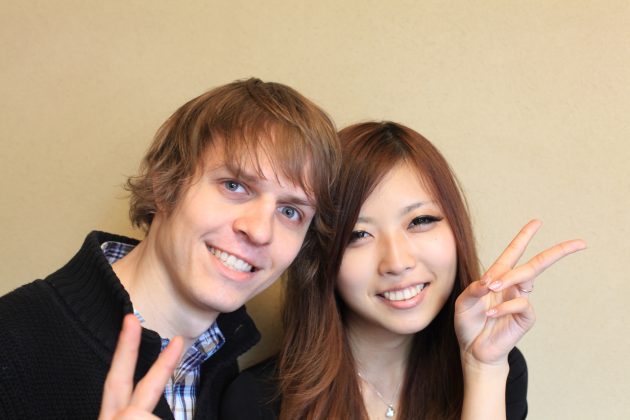
But in general, girls in Japan are not accepted to talk about feelings. They rarely do compliments. Therefore, if you tell a Japanese woman that she likes you, she will be very surprised and delighted.
Also in Japan there is no such thing as “lady first” (lady first). Give the girl a hand, hold the door – no one does. It also surprises Japanese women.
In our candy-bouquet period, the couple meets almost every day, lovers constantly write and call each other. In Japan it is normal if the couple meets once a month or every other week. The girl at this time can walk with her friends, and the guy with friends. In this case, during the separation, the girl and the boy do not communicate much. And it’s not a lack of time – just such a relationship.
But, again, it all depends on the nature of the person. If you really like each other, then just say that you do not accept such communication. I’m sure the girl will change her behavior.
– Japanese women are good housewives?
– In the majority – yes. They themselves will get up, prepare breakfast, if necessary – pat their clothes. In this case, you do not even have to ask. If the couple has a normal relationship, the girl takes care of her man. I think this is not a feature of Japanese women – this is the case in any country.
– Do Japanese marry for love?
– Not always.
For Japanese women, such a thing as “antey” is very important. This is stability. If the guy does not have savings (the average savings in Japan is about 5 million yen, that is, more than 2 million rubles), or he does not understand what he is doing (all kinds of “free artists” in Japan are almost idlers), or he works there , where there is no career growth (in Japan, any work is respected, but nevertheless the loader does not have many prospects), it is unlikely that a girl will marry him. No matter how much they loved each other. If there is no antey, then the Japanese can not imagine a young man to parents, this person can not be connected with the future and give birth to his children.
Therefore, many Japanese women meet with someone they love, and get married for someone who has antey. I have friends who are not together for great love, but simply because they are well with each other and have antaeus.
I think, therefore, in some families in Japan to go to the left – this is normal.
– And what kind of stability are men looking for?
– Men are looking for three things: that the girl was economic, sweet (outwardly) and true. But, again, everything depends heavily on the person. For some, even housekeeping is not important. Japanese sometimes perceive a woman as a beautiful accessory, which you can brag to your friends. This approach has historical roots.
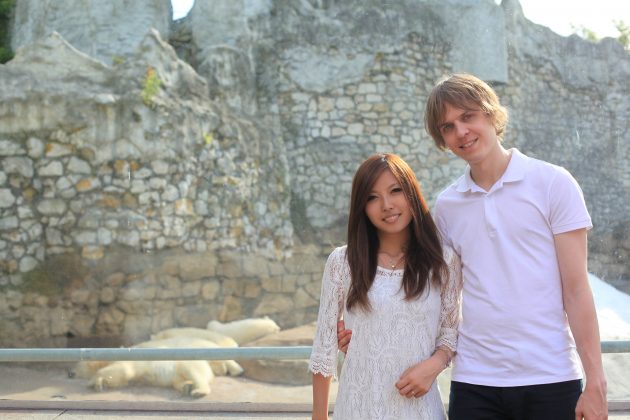
Hikikomori
– Why did you become engaged in videologging?
– Initially, I opened the “VKontakte” group, where I posted photos from Japan, mainly for my friends. I wanted to share with them how I got settled, and I thought that it would support me, give me strength to move on.
Then I had some small videos. For example, how I went to the Museum of the Future in Tokyo. VK in Japan is slow, so I decided to upload a video on YouTube. So the channel appeared. I recorded a few clips about my life in Japan and Japanese. And then he somehow podzabil to it.
But it took about a month, I went to YouTube and found that there were subscribers, a lot of people watched my videos, left comments. It inspired me. Gradually, video blogging became a favorite thing. The channel helps not to forget Russian and allows you to communicate with pretty interesting people.
In addition, I am heartened by the fact that my videos can be useful to those who are going to go to Japan. On the Internet, unfortunately, articles about Japan contain either false or outdated information, or it is extremely small.
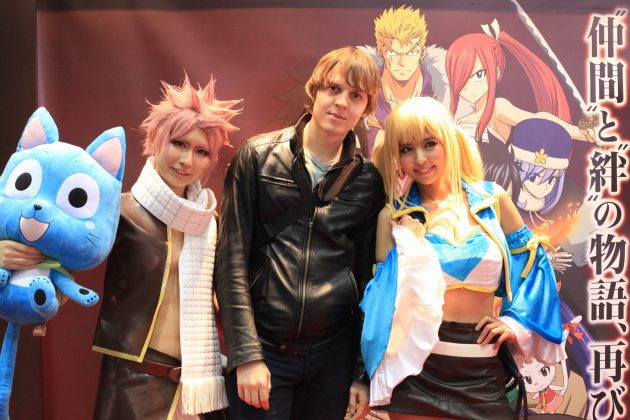
– Who is your viewer and what is interesting you can find on your channel?
– I am mostly Russian-speaking people. Mostly men – 75%. Judging by the comments, I have enough intelligent, adequate subscribers.
As a rule, these are people who like Japan, many animeshnikov (whatever one may say, but the hobby for this country often begins with anime). Therefore, most people originally came to learn something about Japan, but they remain, because there are other topics on the channel.
For example, there is a rubric “Bookshelf” where I talk about books, make reviews and advise what to read. There is also a video where I, while sitting at a cup of tea in my kitchen, tell various stories from life. In addition, I write stories and sometimes make videos on their motives, with beautiful music and video. In a word, I try to make the channel different from Japanese television. ???? That it was interesting and informative.
In 2015, I plan to devote more time to the development of the channel. There will also be a heading about Japanese cuisine.
– Why do you think people like vlogs (videoblogs – Ed.)?
– Depends on what. If my type, then, probably, it’s an attempt to visit a little bit in another country, try on yourself, what is living there. If a person watches a channel, where another person shows how he goes shopping, goes to work, eats, sleeps and so on, then probably we can talk about the effect of hikikomori.
– What it is?
– Hikikomori is a term coined by the Japanese psychologist Tamaki Saito. It means people who consciously leave the society, strive for complete solitude, that is, literally close themselves in their rooms and do not go out for months. This behavior is considered a personality disorder similar to autism. Causes of hikikomori can be psychological trauma, mistakes in upbringing and others.
Hikikomori avoid real communication, it leads to panic, but at the same time as fish in the water feel on the Internet. They can even work there (although, as a rule, hikikomori are children of wealthy parents and sit around their necks). But hikikomori is a serious psychological problem, for such people virtual communication, perhaps, the only joy in life.
The problem is that in Russia and other countries it becomes fashionable to “be” hikikomori. Teens close in the rooms, communicate only on the Internet and call themselves hikikomori. At the same time, by the kick of their parents, they, of course, go to school, communicate with their peers. In other words, they have no psychological problems, they just like to wear a hikikomori mask and keep themselves off from people.
It seems to me that this trend, as well as the generally strong influence of the Internet on social relations, leads to the popularity of taxes. A man is sitting at home. And what to do at home? The Internet! And what on the Internet? See how other people go somewhere and do something. This creates the illusion that your life is also filled with something, there are some events in it.
– Evil pseudo-hikkomikori write you unpleasant comments?
– It happens. I read all the comments, and sometimes one bad spoils the impression of a hundred good ones. Mind you understand that this is a drop in the ocean and the person most likely wrote it out of envy or because the boss at work gave him a scold, but still offended.
I always notice and take into account the constructive criticism – it helps to make the video better. But inadequate people who insult, bath.
– Can I earn money on video blogging?
– Pennies. Need more subscribers, plus YouTube takes 51% of the ad. Therefore, so far the channel is based on enthusiasm.

– Dima, tell us about your creative plans.
– I will develop the channel. I also write two books: one is fiction, the other is popular-entertaining about life in Japan. It will not just be a guide. I want people to know and understand Japan and the Japanese. I plan to publish it in Russia.
– Let your ideas come true. Thank you for the interview!
– And thank you! ????
